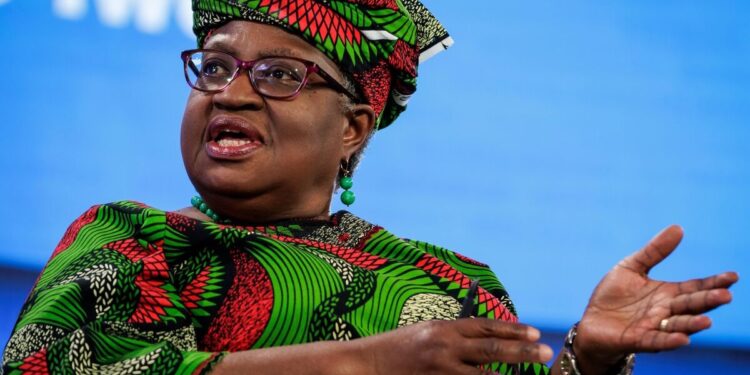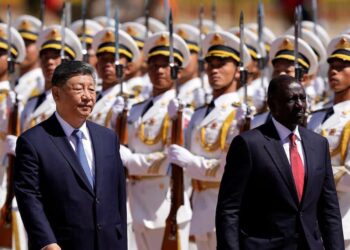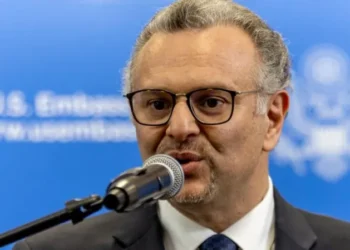By Emmanuel Nduka
At the opening ceremony of the 2024 Annual General Conference of the Nigerian Bar Association (NBA) held in Lagos, Nigeria at the weekend, Dr. Ngozi Okonjo-Iweala, the Director-General of the World Trade Organization (WTO), issued a stern call for an end to the politicization of insecurity in Nigeria.
She spoke in her keynote address titled “A Social Contract for Nigeria’s Future,” addressing a gathering of prominent legal professionals and national leaders. She emphasized the intertwined nature of security and socio-economic progress, stating, “We cannot have socio-economic development without security. We certainly cannot have security without development.”
Highlighting the grave issue of security being exploited for political gains, she remarked, “We all know that security has been weaponized in our country for political purposes by political actors, leading partly to the situation we have now. We have politicians who believe that the best way to make their opponents look bad is to instigate insecurity, making it look like they can’t govern, regardless of whether this leads to loss of lives and property of innocent Nigerians. This has to stop.”
‘Crude Oil Theft Intolerable’
Turning to another critical issue, Okonjo-Iweala addressed the rampant theft of crude oil in Nigeria, condemning it as “intolerable.”
She underscored that the country has access to advanced technologies capable of tracking and combating oil theft. “A second aspect of security relates to the security of national assets. Nigerians have seen for years how organized crude oil theft on a massive scale seriously undermines the economic and financial health of the country. All Nigerians must agree that stealing of our national assets of any type is intolerable and must be stopped,” she stated.
“There is so much technology available now to track such theft and there must be no more excuses for inaction,” she further emphasized.
The conference, themed “Pressing Forward: A National Posture to Rebuilding Nigeria,” was attended by distinguished figures including former Ghanaian President John Mahama and Nigeria’s President of the Court of Appeal, Justice Monica Dongban-Mensem. Nigerian President, Bola Tinubu was represented by Vice President Kashim Shettima, while the Acting Chief Justice of Nigeria, Justice Kudirat Kekere-Ekun, Senate President Godswill Akpabio, and House of Representatives Speaker Tajudeen Abbas were also present through their representatives.
Dip In Nigeria’s Crude Oil Output
According to the Organization of Petroleum Exporting Countries (OPEC), Nigeria’s crude oil production has been severely constrained in recent years by activities of crude oil theft in the Niger Delta Region.
OPEC’s Monthly Oil Market Reports from 2023 and early 2024 indicated that Nigeria’s production fell below its OPEC quota due to various challenges, including oil theft.
Specially in 2023, Nigeria’s oil production averaged around 1.3 million barrels per day (bpd), which is notably lower than its OPEC production quota of approximately 1.8 million bpd.
For the early part of 2024, the situation persisted, with production continuing to lag behind its quota. By mid-2024, Nigeria’s output was reported to be around 1.4 million bpd, still under its designated OPEC quota.
The drop in Nigeria’s oil production quota is largely attributed to the rampant theft and vandalism in the Niger Delta Region, which has led to substantial losses in crude oil output and revenue. This ongoing issue has strained the country’s oil sector and affected its economic stability.
Economic Costs Of Insecurity
The Nigerian Government spends a substantial amount on security. In 2023, Nigeria’s defense budget was approximately ₦1.6 trillion (about $3.5 billion), which is a considerable portion of the national budget.
Insecurity has also deterred Nigeria’s domestic and foreign investment over the years. In 2022, Nigeria’s foreign direct investment (FDI) dropped to $1.1 billion, partly due to security concerns and unstable conditions.
Regions affected by insurgencies and banditry in the Northeast and Northwest regions are suffering severe agriculture inadequacies, leading to food insecurity and further economic losses. Estimates suggest that the conflict in the Northeast alone has cost billions in lost agricultural productivity and displaced millions of farmers.
There is also the humanitarian cost, with millions of internally displaced persons (IDPs) swelling housing, food, healthcare, and education crisis.



































